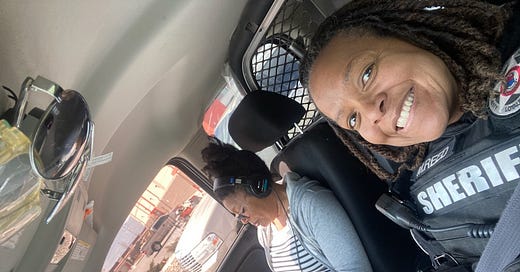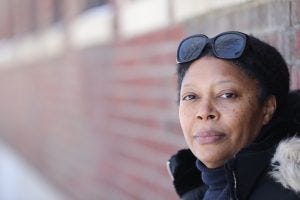Welcome to The Audio Storyteller: tips and tricks for audio producers. Subscribe to get the full list of jobs and training straight to your inbox 💌
We talk a lot about the intimacy of audio, but really taking listeners into someone else’s life is a complicated challenge. Audio diaries are a powerful way to do just that. Told entirely in a character’s own voice, these accounts bring you inside their thought processes, inside their daily struggles - without the interruption or interpretation of a narrator.
Award-winning audio and documentary producer Jo Erickson often uses audio diaries in her work. Jo is a producer for Colorado Public Radio’s Audio Innovations Studio. She currently hosts and reports Systemic, an award-winning podcast that uses audio diaries to document the lives of people working to create change. Season one was about police reform; season two is about education.
Here Jo shares her key tips for producing gripping audio diaries:
Immerse your listeners
Audio diaries became my substitute for work I couldn’t do myself as a field reporter. Coming from the BBC, I made a lot of documentaries about young people - following them as they were dealing with issues. For example I followed a young Black man after he lost his best friend to knife crime. I wanted to still be in that space with people as they’re going through an issue or crisis.
So when I find a subject, I’m trying to see it through their lens - and audio diaries are probably the best way to get to that lens. You can feel immersed in their work [or story].
Start at the beginning
From the outset, you have to do some investigations to know whether this person’s story has legs to give you enough material. They’ve got to be in a space where they still have decisions to make. If they’re already through, forget it - because all you’ve got is reflection at that point. You need to be near the beginning of their story. You need the diarist to be in the moment of whatever crisis they’re going through.
Some stories already have a natural beginning, like a shooting. That would be a beginning - it’s like, how do you heal from that trauma.
Let’s take the new season of Systemic as an example. For episode one, No Equity, No Voice, I met a woman called Melissa, a lovely Black woman who is a school volunteer and has four children at the school. She showed me a video that was so horrific. In it, Melissa is directing traffic at the school when out of the blue she is assaulted verbally by another parent who was picking up her white kid. There were a lot of N words - it was really nasty. Melissa had the gumption to film the incident. When I saw the video, I knew this wasn’t going to disappear. I knew she was at the beginning of this thing - she still has to take her kids to the same school this woman’s [kids are] at. It was like, how does a Black woman navigate this?
Think of the wider context
Diaries can be a way for us to cover a broad subject or systemic issue through a focussed perspective. In Melissa’s story, there was the bigger picture of school boards being taken over by radicalised parents. They want to stop the teachings of Black History Month, they don’t want their children to know about LGBTQ - that’s the backdrop of this story. Melissa took me on her journey - and what the school did to remedy the situation, which was very little.
She recorded herself on good days, bad days. I recorded her children as they dealt with this, I recorded the school board as they banned the equity board. I recorded school board meetings where people were just incredibly racist. But it was all through her lens. You felt like you were really in her life - you felt her anxieties, you felt her children’s anxieties.
Listen and guide
It’s your responsibility to listen to the audio diaries as soon as you’re sent them. Log them and listen! Then if you need more information, it’s about asking the diarist to stay in the moment a little longer.
Often when people are talking about their lives, they’ll say, “I don’t know what to talk about”. It’s your job to help them along. Because inevitably the first few diaries you get won’t say all that much - it’s surface level: “I went to the shop today, then I did this, then I did that.” So you’re going to listen and ask them to tell the story: what shop was it? Who did you meet? What happened in the parking lot? Logistically you can do this via an interview, and then cut out your own questions in the edit.
The process takes a while because the journey is on both sides. Remember that we’re privileged in that they are opening up their lives. You always want to be thanking the diarist and praising what they’ve recorded.
Start building your story arc early
While you’re listening you’ll see there’s a lot of stuff that you don’t want or need: you’re cherry-picking the best bits. And then you’re thinking about where to expand the story, what the key areas might be. You need to start plotting the story arcs and have your highs and lows.
Not all diaries have to be explosive
In S2E3 of Systemic, Tipping Point, we meet Kevin, a Black teacher. He was the poster boy for pushing equity in his school. But there was something he said to me that I thought, oh I can see this as a story. He said: “Every day, I wake up and I just want to leave.” The backdrop is so many people have left the teaching profession - there’s a teacher shortage, it’s an absolute crisis. And for teachers of colour, it’s really bad.
I spoke to Kevin a couple of times but wasn’t sure what I could do with this. Because what he was describing was so difficult to capture: he was describing microaggressions towards him as a Black male teacher. How do you capture that? It’s nuanced.
It meant investigating things that happened during the school year that seemed to recur in his life. For example, Kevin teaches AP history. And his English-teacher colleagues would be asking him about the use of the N word historically in Huckleberry Finn. He’s like, “you guys shouldn’t be coming to me with this because I’m a Black person!”
Or another time when he was talking about Black girls being very loud in class. And how that was being interpreted [by other teachers] as ‘they’re unruly, they’re not listening’. Kevin was explaining, ‘actually they’re excited! They’re really into the class but you’re interpreting that behaviour as disruptive and something that needs to be suppressed.’ It’s like why are you sending young people to detention because they have a different way of expressing their engagement? Can’t we have space in the classroom for them to express their joy?
So with Kevin’s journey, it wasn’t the explosive story with big drama moments. It was smaller, it was nuanced. But it was something that I don’t think anyone has ever discussed: what do microaggressions really mean and how do they impact people over the course of a year? People didn’t necessarily see things from a Black teacher’s lens, or see how these microaggressions might be connected to why teachers are leaving [the profession].
(As for where that diary began in time, I started it at the beginning of the school year - so you can find a chronological beginning in that way).
You want scene tape
For instance if your diarist is going to have a meal with their extended family, ask them to put the phone in the middle of the table with everybody talking. I don’t care if they’re all talking over each other - I’m bound to get something that’s lovely for my purposes. 95% of that tape I can’t use, but 5% of it will be exquisite! It’ll be scene-setting, it will give me drama, it will immerse me in that scene. So keep in touch with the diarist, ask where they’re going, and if they can record there.
It’s a relationship
Your diarist might be having a bad day and you can hear that in their voice - but maybe you don’t have enough of that tape. So you need to have a difficult conversation where you ask them to stay in that low moment and really explore it.
For that, you need to have developed a good rapport with them. And it’s more than journalism, it’s like being a friend. I don’t like the word exploitative, but in journalistic terms it can be seen as exploitative. In podcasting terms, it’s storytelling. You want those deep moments. They’re talking to you as someone that they trust. This is key with audio diaries - because it’s not parachute journalism where you come in, do the story and you never see them again. This is a prolonged relationship, and like any relationship it develops over time. I often share my own personal moments with them, which encourages them to share.
Be mindful of trauma
Everyone is different in how they express or navigate trauma. S2E3 of Systemic, Safe Space, features Naomi, an educator who has a gender-fluid 10-year-old. It’s the same school district as Melissa, where they’re targeting LGBTQ youth. Naomi’s freaking out; she’s scared. At some point she doesn’t want her child to be in the school. The bullying and the abuse is just out of control.
I suggested using the audio diary as therapy. So every night before she went to bed, she would decompress her day. She was sharing that she was frightened, she was crying. She’s pouring her heart and soul out because there’s no one to turn to in the school. She’s feeling isolated and using her audio diaries to let it out.
I know I’ve got this really sensitive tape. So I started editing and then sent it to her. This is the biggest no-no for journalists to send your edited stuff to the person that you are telling the story about! But I think it’s a courtesy and I don’t want to exploit or make things worse. So I don’t hide anything. I asked her, is there something I should change - and I will change it. I was happy to have her guidance - and then I took it to my editor from there.
Logistics
In terms of recording, you’ve got to make things easy for people - always, always. I’ve never given anyone any equipment, they always record on their phones.
How often the diarist records is subjective, but my starting point is two diaries per week. If I haven’t had something in four or five days, I’ll prompt them – in a friendly way!
As for the length of the process, I always go in thinking three to six months. Some of them have been longer because I wasn’t sure what the ending was. As the producer, you’ll know when the ending is. You want to make sure you’re still in the moment, where the story is still happening – not reflections.
Thanks for reading audio storytellers! Appreciate your support by buying me a coffee or forwarding this newsletter to a friend.






I've been really disappointed in trying to find audio documentaries lately. I want cinéma vérité, but no one makes them in that style. What Jo is doing sounds close to what I'm looking for. Thanks for sharing her work.